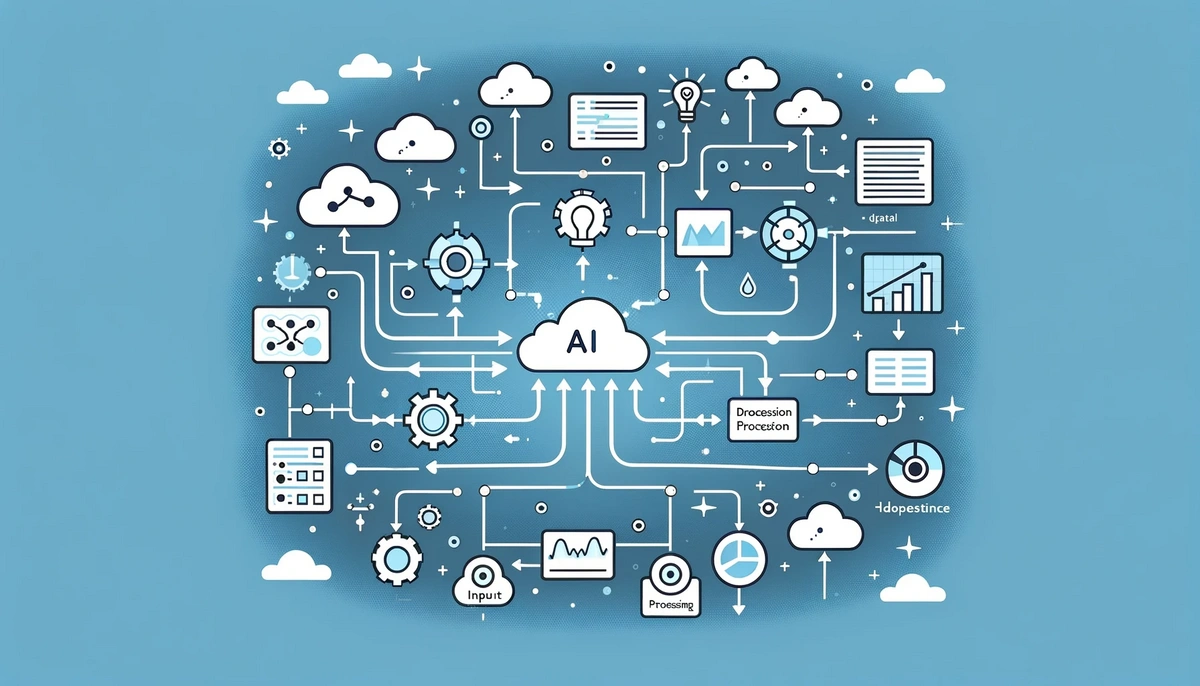The Role of AI and Big Data in Transforming Business
The Data Explosion and the Rise of AI
The 21st century has witnessed an exponential increase in data generation. This surge, primarily driven by digitalization and the Internet of Things (IoT), has led to the era of big data - characterized by large, complex datasets that traditional data processing software can't handle effectively. Enter Artificial Intelligence (AI). AI, with its capability to process and analyze vast amounts of data, has become an indispensable tool for businesses looking to extract value from this data deluge.
Harnessing Data: The New Competitive Advantage
-
Data as a Strategic Asset: In this data-centric world, data is not just a byproduct of business activities but a critical asset. Businesses are utilizing big data to gain insights into market trends, customer behavior, and operational efficiencies.
-
AI-Driven Insights: AI transforms raw data into actionable insights. Machine learning algorithms can identify patterns and anomalies, predict future trends, and offer recommendations. These insights are crucial for strategic decision-making, allowing businesses to anticipate market changes and respond proactively.
Enhancing Customer Experience
In an increasingly competitive market, personalization is key to customer retention and satisfaction. AI and big data enable businesses to understand and anticipate customer needs and preferences, leading to tailored products, services, and marketing strategies. This level of personalization fosters a stronger connection between businesses and their customers.
Streamlining Operations
AI and big data are also revolutionizing operational processes. From automating routine tasks to optimizing supply chains and predicting maintenance needs, AI-driven solutions are enhancing efficiency and reducing costs. This operational agility allows businesses to adapt quickly to changing market dynamics.
Fostering Innovation
Finally, the combination of AI and big data is a powerful driver of innovation. It enables businesses to explore new opportunities, develop innovative products and services, and redefine industry standards. This continuous innovation is essential for long-term growth and competitiveness.
Navigating Challenges and Ethical Considerations
Addressing the Complexities of Big Data
While big data offers immense opportunities, it also presents significant challenges. These include:
- Data Quality and Management: Ensuring the accuracy, consistency, and reliability of data is paramount. Poor data quality can lead to flawed insights and decisions.
- Data Integration: With data coming from diverse sources, integrating this data into a coherent and usable format is a complex task.
- Storage and Processing: The sheer volume of data requires robust storage solutions and efficient processing capabilities.
Ethical AI: Balancing Innovation with Responsibility
As AI systems become more integral to business operations, several ethical considerations arise:
- Bias and Fairness: AI algorithms can perpetuate and amplify biases present in the training data. Ensuring fairness and eliminating biases is crucial for ethical AI practices.
- Transparency and Accountability: There is a growing need for AI systems to be transparent in their decision-making processes and for businesses to be accountable for their AI's actions.
- Privacy Concerns: AI's ability to analyze vast amounts of data raises concerns about individual privacy. Businesses must balance data utilization with respect for privacy rights.
The Data Security Imperative
With the increasing reliance on big data and AI, cybersecurity becomes a critical concern. Protecting data against unauthorized access, breaches, and theft is paramount for maintaining trust and complying with regulatory standards.
The Skills Gap Challenge
The specialized nature of AI and big data technologies has led to a skills gap in the workforce. Businesses need to invest in training and development or seek skilled professionals to leverage these technologies effectively.
Regulatory Compliance
As governments worldwide introduce regulations regarding data privacy and AI (such as GDPR in Europe), compliance becomes a complex yet essential aspect of utilizing AI and big data.
Future Outlook and Emerging Trends
The Evolving Landscape of AI and Big Data
As we look towards the future, AI and Big Data are set to undergo significant evolution, driven by advancements in technology and changes in business needs.
-
Advanced Machine Learning and AI: The evolution of AI will see more sophisticated machine learning models, capable of more accurate predictions and deeper insights. This includes the rise of deep learning and neural networks, which mimic human brain functions.
-
Increased Integration of IoT: The Internet of Things (IoT) will continue to proliferate, providing a continuous stream of real-time data. This integration will enhance the capabilities of AI and Big Data, leading to more dynamic and responsive business models.
-
Cloud Computing and AI-as-a-Service: Cloud computing will play a critical role in providing scalable resources for AI and Big Data processing. AI-as-a-Service (AIaaS) will emerge as a popular model, offering businesses access to AI technologies without the need for extensive in-house expertise.
Predictive Analytics and Decision Intelligence
Predictive analytics, powered by AI and Big Data, will become more prevalent, enabling businesses to forecast trends and make proactive decisions. Decision intelligence, which combines several decision-making disciplines, will emerge as a key strategy, improving the quality and outcomes of business decisions.
Personalization at Scale
Personalization will move beyond marketing, influencing product development, customer service, and overall business strategies. AI's ability to analyze customer data at scale will allow businesses to offer highly personalized experiences to a broader customer base.
Ethical AI and Responsible Data Management
The focus on ethical AI and responsible data management will intensify. Businesses will invest in developing AI systems that are ethical, transparent, and compliant with increasingly stringent regulations.
Addressing the Skills Gap
To keep pace with these advancements, the business world will focus on upskilling employees and fostering a culture of continuous learning. Partnerships between academia and industry will play a crucial role in preparing the workforce for the future of AI and Big Data.
The Impact on Industries
Every industry, from healthcare to finance, retail to manufacturing, will feel the impact of these advancements. Businesses that adapt quickly and effectively to these changes will lead the charge in innovation and competitiveness.
Best Practices for Implementing AI and Big Data in Business
Developing a Data-Driven Culture
-
Leadership Commitment: Success in AI and Big Data initiatives starts at the top. Leadership must commit to a data-driven culture, promoting data literacy and analytics across all levels of the organization.
-
Continuous Learning and Adaptation: Encourage a culture of continuous learning. Keeping up with AI and Big Data advancements is crucial for staying competitive.
Strategic Planning and Goal Setting
-
Clear Objectives: Define clear, measurable goals for AI and Big Data initiatives. Align these objectives with overall business strategy to ensure coherence and focus.
-
Prioritizing Projects: Start with projects that have a clear ROI and can demonstrate the value of AI and Big Data to stakeholders.
Building the Right Team
-
Multidisciplinary Approach: Create a team with diverse skills – data scientists, AI experts, domain specialists, and business analysts. This diversity ensures a comprehensive approach to problem-solving.
-
Training and Development: Invest in training current employees in AI and Big Data skills. This builds internal expertise and reduces reliance on external consultants.
Data Management and Governance
-
Robust Data Infrastructure: Invest in scalable and secure data infrastructure. Ensure that your data management systems can handle the volume, velocity, and variety of big data.
-
Data Governance: Implement strong data governance policies to maintain data quality, compliance, and ethical standards in data usage.
Ethical Considerations and Compliance
-
Ethical Frameworks: Develop and adhere to ethical guidelines for AI and Big Data use, focusing on fairness, transparency, and accountability.
-
Regulatory Compliance: Stay abreast of and comply with relevant data privacy and AI regulations in different jurisdictions.
Measuring Success and Continuous Improvement
-
Performance Metrics: Establish key performance indicators (KPIs) to measure the success of AI and Big Data initiatives. Regularly review and adjust these metrics to align with evolving business goals.
-
Iterative Approach: AI and Big Data projects should be iterative, allowing for continuous improvement based on feedback and changing business needs.
Conclusion
In summary, the partnership between AI and Big Data is revolutionizing the business world, offering unprecedented opportunities for innovation and growth. These technologies are not just enhancing the efficiency and effectiveness of business operations but are also redefining how companies interact with customers and make strategic decisions. As AI continues to evolve and big data grows ever more integral, their combined potential in driving business success becomes increasingly clear.
However, this journey is accompanied by significant challenges, including data management complexities, ethical considerations, and the need for specialized skills. For businesses to fully leverage the benefits of AI and Big Data, a strategic approach focused on ethical practices, continuous adaptation, and upskilling is essential. Embracing these technologies while navigating their challenges is key for businesses looking to thrive in the rapidly changing digital landscape.





